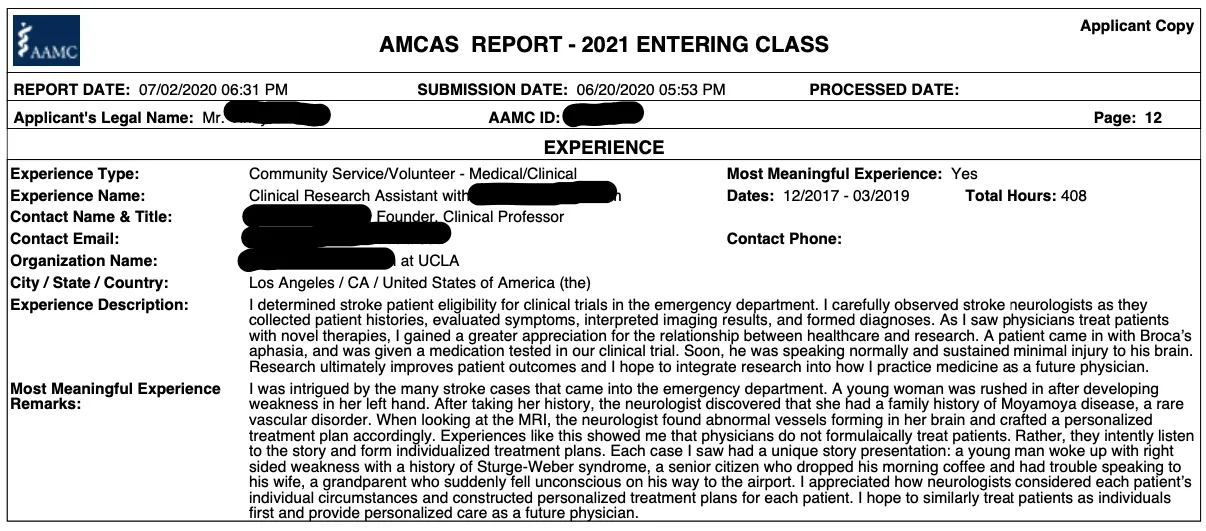
July 30, 2025
Written By
Michael Minh Le
Subscribe to the Premed Catalyst Newsletter

You’ve probably stared at your AMCAS Work & Activities section and wondered, “Which three experiences do I choose as my ‘most meaningful’?” And, “What if my experiences don’t feel “life-changing” enough?” Or, “What if my reflection sounds fake or forced?”
This guide will walk you through exactly how to identify and write about your Most Meaningful experiences in your AMCAS application. We’ll break down what makes an experience truly “meaningful,” how to structure your narrative with clarity and impact, and the framework that works with any experience. We’ll also show you real examples and answer common questions to give you a clear path forward.
If you want to see how successful applicants wrote their own Most Meaningful experiences, we’re giving you free access. At Premed Catalyst, we’ve created an Application Database of 8 full AMCAS applications complete with actual MMEs. Learn what works by seeing the real thing. Then use it to craft your own acceptance-worthy application.
Get your free resource here.
“Most meaningful” doesn’t mean the longest. It doesn’t mean the most prestigious. And it definitely doesn’t mean the one that looks best on paper.
It means you changed because of it.
A most meaningful experience is the one where something clicked or unraveled, and you came out of it different. It’s the shadowing day when you stopped just watching and started thinking like a provider. The service trip where a patient taught you more in five minutes than your entire public health course. The research project where you faced failure, owned it, and still showed up the next day.
These experiences don’t have to be loud. But they must be formative. Here’s the litmus test: If an interviewer asked you, “Why did this matter to you?”— could you talk for 10 minutes straight without sounding rehearsed? Could you light up, pause, get a little choked up, and say, “This changed everything”?
That’s your most meaningful.
Start with this question: If everything else on your AMCAS application were deleted, which three experiences would you fight to keep?
That’s your shortlist.
Choosing your Most Meaningful experiences isn’t about what you think AdComs want to hear. It’s about what you need them to know. What experiences hold the DNA of who you are and who you’re becoming as a future physician?
Think across these three dimensions:
Did this experience challenge you? Stretch you? Force you to confront something uncomfortable or unfamiliar? Maybe it redefined your beliefs or rewired the way you think about medicine, service, or yourself.
Did you make a tangible difference for a patient, a team, or a community? Were you part of something bigger than yourself? Even small wins count here, especially if they were hard-earned.
Did you show up consistently? Not just physically, but emotionally and mentally? The most meaningful experiences usually span months or years, not a weekend trip that looked great on Instagram.
Here’s a trick: Think about what you’d still be doing even if it didn’t help your med school app. That’s probably meaningful.
Not all experiences are created equal, but some categories tend to carry more weight when labeled “most meaningful,” especially when they show depth, ownership, and transformation.
Here are four categories that consistently shine on strong AMCAS applications:
Clinical experiences include direct patient care roles like being an EMT, medical assistant, scribe, phlebotomist, or CNA. What matters most isn’t the job title. It’s whether you were paying attention. Did you observe the clinical decision-making process? Did you start to see patients as whole people, not cases?
Especially translational, interdisciplinary, or team-based work. Research that goes beyond pipetting and into problem-solving, collaboration, and curiosity. Bonus points if you can explain why your research mattered and what it taught you about asking better questions.
Working with underserved populations. Health advocacy. Mentorship. This is your chance to show empathy in action, not just compassion, but commitment. Real service means you listened, adapted, and kept showing up.
And no, being president of a club isn’t leadership by default. Leadership is taking initiative. It’s building something that didn’t exist before or making something better for the people who come after you. If you launched a peer tutoring program or turned around a struggling student org, that’s the kind of leadership that makes AdComs take notice.
A Most Meaningful experience isn’t a resume bullet. It’s a story. And stories stick. That’s why your narrative matters just as much as the experience itself. A compelling narrative transforms a basic entry into a window into who you are and how you think.
Below is your storytelling formula: vignette + reflection + future.
Use it, and your Most Meaningful experience won’t just be readable. It’ll be unforgettable.
Start with a snapshot. One vivid, specific moment that pulls the reader in. The night you stayed late to comfort a scared patient. The exact words a mentor said that changed how you think. The failed experiment that forced you to pivot.
Keep it focused. Don’t summarize the whole experience. Zoom in on a single scene that represents the whole arc.
Now step back. What did that moment mean to you? What insight did it give you into medicine, yourself, or the people you want to serve?
This is your chance to show emotional intelligence and maturity. It’s not about being perfect. It’s about being thoughtful.
End with momentum. How will what you learned shape you as a future physician? How will this experience inform how you interact with patients, lead teams, or advocate for change?
Tie it forward. Show that this wasn’t just a memory. It’s the foundation of the doctor you’re becoming.
Most premeds freeze at the blank screen. And it’s not because they don’t have the experience, but because they don’t know where to start. The pressure to sound profound or polished kills momentum before it begins.
Here’s the truth: great writing doesn’t start with perfect words. It starts with honest ones.
You don’t need metaphors or sweeping arcs. You need clarity. You need a story that feels real. That’s what this breakdown is for: to take you from foggy memory to a focused, unforgettable narrative.
Open a blank doc. No filters, no word count. Write down every experience that left a mark on you. It can be clinical, research, service, or personal. Don’t worry about whether it’s “most meaningful” yet. Just get it all out.
For each one, jot down a few quick bullet points:
Now take a step back. Look at your experiences and ask: What does this show about me that nothing else does?
Find the angle. Maybe your EMT role isn’t just clinical—it’s where you learned how to stay calm in chaos. Maybe that lab job taught you persistence more than pipetting.
Every experience can be told from a hundred angles. Choose the one that shows you: your depth and your growth.
Use the structure: Vignette → Reflection → Future Framework.
This is your first draft. Focus on getting the story out, not getting it perfect.
Lead with the moment that changed something in you. Reflect on what that meant. Tie it to the kind of doctor you’re becoming.
It should read like a story, and it should be something only you could have written.
Your first draft will be too long. That’s good. Now cut.
Trim fluff. Kill clichés. Sharpen your verbs. Make every sentence earn its spot.
Read it out loud. If it sounds robotic or generic, rewrite it. And if it moves you, even just a little, you’re getting close.
And when in doubt, remember: clarity over cleverness. Depth over drama. Honesty over impressiveness.
Your Most Meaningful experiences should sound like you. Not the polished version of you that you think AdComs want to see. The tone should be confident, reflective, and clear, not overly academic, but also not overly casual.
Here’s how to strike the right balance:
The best way to understand what works is to see it in action. Below are real examples from successful applicants who turned ordinary roles into compelling, reflective narratives that stood out to AdComs.


You’re staring at three little boxes, each with a 1,325-character limit, trying to distill your most formative experiences into something deep, but not dramatic. Personal but not performative. You second-guess every sentence. Is this meaningful enough?
We’ve been where you are. We know this part of the AMCAS can feel like a high-stakes puzzle with invisible rules.
That’s why we built a free resource to make this easier: a full database of real AMCAS applications—8 complete sets, written by successful applicants who got into top-tier med schools. You’ll see exactly how they framed their clinical, research, service, and leadership stories. No guesswork. No vague advice. Just the real thing.
If you're serious about writing MMEs that stand out for all the right reasons, this is your starting point.
Get the free resource here.
Each Most Meaningful Experience entry allows 1,325 characters, including spaces. That’s roughly 200–220 words. It’s not much, but it’s enough to tell a powerful story when you focus on a single moment, reflect meaningfully, and connect it to your future in medicine.
Absolutely. Paid work can be just as impactful, sometimes more so, than unpaid volunteering. What matters is the growth, insight, and commitment you gained from the experience, not whether it came with a paycheck. Just be sure to frame the experience with the same depth and reflection as you would any other.
You do. You're just too close to them to see it clearly. Impact isn't about saving lives or having dramatic moments. It's about what changed you. Think smaller: a patient conversation that stuck with you, a mistake that taught you something important, a moment where you found your voice. Start there.
Yes, but don’t copy and paste anything. Strong applications echo, they don’t repeat. It’s completely fine (and often strategic) to reinforce a key theme like service, resilience, or cultural humility across your MMEs and personal statement. Just approach it from different angles and use different stories to build a richer, more complete picture of who you are.